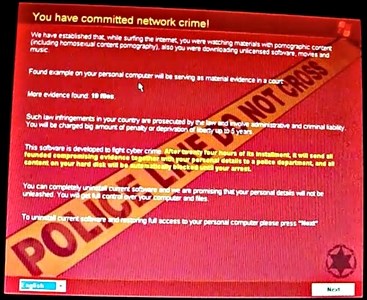
Const. Kris Clark with the RCMP is warning about three scams making the rounds lately.
(MARSHALL JONES / iNFOnews.ca)
January 24, 2014 - 11:22 AM
SCAMMERS CONSTANTLY CHANGE TACTICS TO GET YOUR MONEY
KELOWNA - Criminals are coming up with new ways to steal your identity and make off with your hard earned money.
The RCMP are warning of three scams that are making the rounds in a big way. They rely on the tried-and-true fraud technics that have been around for years.
Const. Kris Clark says over the past couple of weeks they have been getting more and more reports about phishing scams that are specifically designed to get your financial information. They are so widespread the police have even given them names.
They're called the Microsoft Scam, the Revenue Canada Scam and the Scareware Scam.
The Microsoft Scam
It’s a cold call from a person claiming to represent a well-known brand like Microsoft. They tell you (the potential victim) that they have detected a problem like a virus on your computer. The scam revolves around getting you to give them remote access to your computer. The scammer wants to show where the fake problems are and convince you to pay a fee to fix the problem. There’s actually nothing wrong with your computer. Both your credit card information and the data on your computer are compromised.
The Revenue Canada Scam
It begins with a cold call, an email or letter claiming to be from the Canada Revenue Agency (CRA). The scam asks you to verify your personal information, such as social insurance, credit card, bank account and passport numbers. The scammer says if you give them this information you’ll get a refund or a benefit payment. Providing your personal information will not get you a refund or payment. It will only compromise your credit.
Scareware Scam
This is a nasty one. The Scareware or Ransomware scam, is a pop-up message that says your computer has been frozen, or will be frozen, unless you pay. The virus was piggy-backed on some other data you downloaded from the internet. The message is designed to shock you and create instant anxiety so you won’t think, you’ll just send the money. Even if you pay the money, your computer won’t be unlocked. You’ll never get the money back. You'll need to call a computer technician to get rid of the infection.
All of these scams are preventable if people stop to think. You should never give out personal information to someone you don't know. And the old cliche is true, "If it's sounds to good to be true it probably is."
If you’d like more information on the Revenue Canada Scam go to the CRA website.
The Canadian Anti-Fraud Centre’s website is a good resource on the phishing and other scams that are out there.

An example from a YouTube video of what ScareWare or RansomeWare might look like.
Image Credit: (SOURCE/YouTube)
News from © iNFOnews, 2014